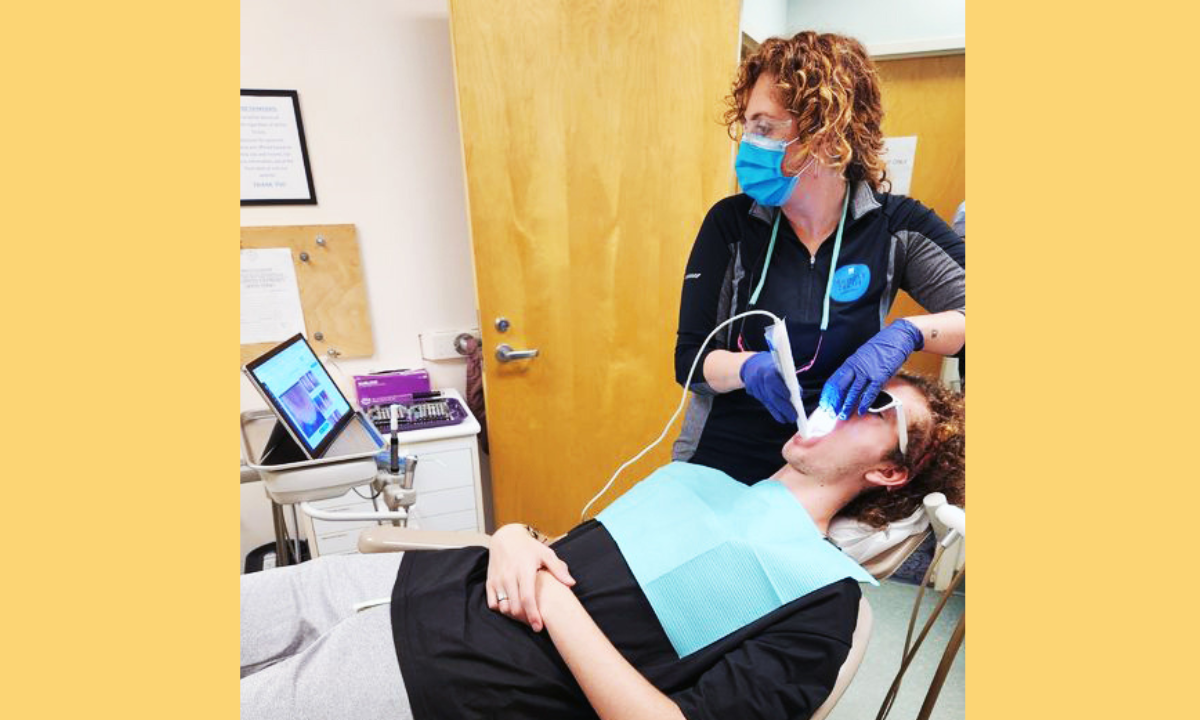New Course to Improve Access to Dental Care in Maine
June 6, 2024

Amber Lombardi, founder and CEO of Mainely Teeth, provides care to a patient as part of a non-profit dental clinic lead by an independent practice dental hygienist in Maine.
A new course that supports dental hygienists in Maine is being offered through the University of Maine at Augusta (UMA), with assistance from MCD Global Health and the Children’s Oral Health Network (COHN) of Maine.
Even though many patients are enrolled in Medicaid in Maine, only 3% of Maine’s dental practices see a significant number of such patients in their practice, the lowest rate in all 50 U.S. states according to a 2021 research brief by the American Dental Association.
Additionally, Maine is facing a dental health workforce shortage. COHN has formed an Oral Health Industry Partnership to implement efforts to address this shortage and other related issues, with funding from Maine’s Department of Labor.
One of these efforts is a new course at UMA for dental hygienists in Maine who want to become independent practice dental hygienists (IPDHs) with MCD providing leadership and content expertise.
"A critical component of the Oral Health Industry Partnership is to strengthen and diversify the dental workforce in Maine and improve access to oral health services,” said Becca Matusovich, executive director of COHN. “Building a larger pool of IPDHs will help hygienists broaden their career advancement opportunities and hopefully lead to more preventive dental services available to children in schools and other community settings, especially in the more rural parts of the state."
Courtney Vannah, MCD’s senior program manager of Oral Health Initiatives, and Tracey Jowett, an assistant professor of dental health at UMA, are teaching a seven-week course this summer that they developed as part of the UMA dental hygiene program. Jowett was one of the first practicing IPDHs in Maine with experience increasing access to affordable oral health care for children through the mobile dental nonprofit Saving Smiles of Maine.
“This is monumental for a few reasons: IPDHs are a key answer to addressing Maine's access to care crisis, and this type of professional support has historically not been included in dental hygienist training programs despite IPDH practice being in the scope of practice in Maine for well over a decade,” Vannah said.
Open to all registered dental hygienists in Maine who want to learn more about independent practice, the course is taught virtually on a weekly basis from May through June with a total of 30 students participating.
“The evidence-based research supports expanded public access to dental hygienists,” Jowett said. “As dental hygienists, we have always known that primary dental disease prevention and early intervention is key to improving public health. Having the opportunity to share knowledge with a group of dental hygienists who are seriously interested in improving access through preventive dental hygiene outreach for Maine communities is exciting.”
Students earn three college credits and up to 20 continuing education credits and must either have an active registered dental hygienist license in Maine or be currently enrolled in UMA’s Bachelor of Science in Dental Hygiene program. Registration for this course is closed. The course is eligible for tuition remission through the Maine Department of Labor’s Tuition Remission Program.
“The response has been overwhelming,” Vannah said. “This is just one piece of an enormous amount of workforce development activity happening in Maine, but it is a wonderful development to support the oral health prevention specialists of Maine: the dental hygienists.”